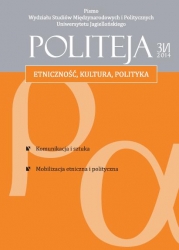Bośniacko-hercegowińska etnonacjonalna polityka w kontekście ustroju i przyszłości państwa
The Ethno‑politics and the Status of the Sovereignty of Bosnia and Herzegovina
Author(s): Marinko ZekićSubject(s): Politics / Political Sciences
Published by: KSIĘGARNIA AKADEMICKA Sp. z o.o.
Keywords: Bosnia and Herzegovina; multiculturalism; ethnopolitics; political elites; ethnic conflict; Dayton Peace Agreement; state building process; democratization; European integration
Summary/Abstract: The underlying aim of the article is to contribute to the understanding the relation between ethnic claims and policies which determine social relations in Bosnia and Herzegovina, and the debate on the current constitutional crisis in this country. The present ethno‑political regime heavily depends on the perpetual crisis as the primary source of political articulation and action. Though the Dayton Accords ended war and established peace in Bosnia and Herzegovina, the agreement did not create a functional central government, lacking the capacity to undertake the reforms needed to meet the terms of accession to the European Union. The peace treaty designed future state structures around the very ethnic‑based power struggles that shaped the conflict. As a result, ethnic‑based politics continued to dominate political space. These politics, combined with high levels of international oversight have distorted the state building process, and reduced democratization efforts. Today, Bosnia’s future is still uncertain. Political squabbles have seriously detracted from Bosnia’s ability to engage in reforms needed to boost its economy and move closer to the EU. Conflicting ambitions of national party leaders is an important factor in this failure. Representatives of an ethnic group can veto any decision that they feel does not accord with their interests. This means in effect that all major decisions have to be made by consensus among the main ethnic parties, which is often very difficult since they have fundamentally different views on Bosnia’s future. Although Bosnia and Herzegovina is currently not in danger of being dismembered, awareness that the country cannot survive without multi‑ethnic collaboration should remain one of the guiding principles for Bosnia’s ruling ethnically‑based political parties.
Journal: Politeja - Pismo Wydziału Studiów Międzynarodowych i Politycznych Uniwersytetu Jagiellońskiego
- Issue Year: 11/2014
- Issue No: 31
- Page Range: 523-538
- Page Count: 16

